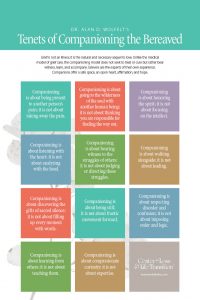Companioning is about going to the wilderness of the soul with another human being; it is not about thinking you are responsible for finding the way out.
by Alan D. Wolfelt, Ph.D.
“The only map that does the spiritual traveler any good is the one that leads to the center.”
—Christina Baldwin
When someone we love dies and we feel suffering, it does not mean that something is wrong. Going into the wilderness of the soul with another human being is anchored in walking with them through spiritual distress without thinking we have to have them attain “resolution” or “recovery.”
Being in the wilderness relates to being in a liminal space. “Limina” is the Latin word for threshold, the space betwixt and between. Liminal space is that spiritual place where most people hate to be, but where the experience of grief leads them. This is often where the griever’s worldview—the set of beliefs about how the world functions and what place they as individuals occupy therein—comes into question. Putting one’s shattered worldview back together paradoxically requires companions who do not think their helping role is to fix or give answers or explanations. There is no technique, no formula, no prescription for the wilderness experience.
A critical part of being present to someone in the wilderness of the soul is to be open to states of not knowing the outcome or trying to force the outcome. Most North Americans have trouble trusting in this process and feel an instinctive need to get the mourner out of the wilderness, or, at the very least, to try to move them to the left or the right. We have become a people who demand answers, explanations and expect fast and efficient resolutions.
The Ambiguity of Loss
We don’t like pain, sadness, anxiety, ambiguity, loss of control—all normal symptoms of the wilderness of grief. We want to experience light before we encounter darkness. If we as caregivers cannot be still in the presence of these care-eliciting symptoms, we will be tempted to explain or treat them away. After all, we falsely think that any explanation is better than being in liminal space. A sense of control is better than the terrible “cloud of unknowing.” Yet, the opposite of control is actually participation—in this context, participation in the work of mourning while one is “under reconstruction.”
 The challenge for many caregivers is to stay on the threshold of the wilderness without consciously or unconsciously demanding or projecting a desire for resolution. In other words, there is a tendency to be attached to outcome, not open to outcome. Obviously, the instinct to move the mourner away from pain and suffering is rooted in the desire to stay distant from one’s own pain.
The challenge for many caregivers is to stay on the threshold of the wilderness without consciously or unconsciously demanding or projecting a desire for resolution. In other words, there is a tendency to be attached to outcome, not open to outcome. Obviously, the instinct to move the mourner away from pain and suffering is rooted in the desire to stay distant from one’s own pain.
Sadly, many people, caregivers and lay public alike, have come to regard grief as an enemy. Brokenness is not something we choose to invite in. Instead of honoring the wise words of Joseph Addison, who once said “I will indulge my sorrows, and give way to all the pangs and fury of despair,” our contemporary mantra seems to be more aligned with the words of the Bobby McFerrin song: “Don’t Worry, Be Happy!”
The No Place That Is Grief
In contrast, ancient cultures seemed to understand the value of being in the wilderness as a part of any kind of major transition in life’s journey. They often invited themselves into the wilderness through experiences such as spending 40 days in the desert, climbing to the mountaintops, and taking solo journeys into the ocean. Whatever the underlying set of beliefs, to get where he was eventually going the journeyer first had to experience going to nowhere, to release himself from who and what he had been. In the “no place” of the wilderness he could begin building a new person and place again.
This resonates with my experience of companioning people in life transitions. It seems we cannot integrate loss into our lives until we embrace the fear and sometimes raw terror of going to this “no place” wilderness and descending into it on our way through it. Then and only then do we begin to notice that something begins to slowly shift as we open our hearts to the pain of grief.
Of course, there are powerful forces that invite mourners to do otherwise. We are told to “keep busy,” “carry on” and “find someone to meet.” Following these mourning-avoidant scripts, the griever may try to retrace her steps back to a time or place that feels familiar, a place to find one’s “old self”—but that old self is gone forever. Now, being temporarily lost in the wilderness of grief is that familiar place. Slowly, over time and with gentle companions, the mourner can search for renewed meaning and discover a new self.
But through this time of turmoil, the discomfort and mystery of being in the wilderness is meant to be. In reality, it is actually a kind of “purification phase”—it is just one phase of the journey that will very slowly change into something else. The important thing is to learn to honor and respect this process and to lean into it despite the instinct to do otherwise.
Detachment and Grief
Central to not being attached to outcome is the concept of detachment. The majority of Westerners think of “detachment” as a lack of warmth and caring. Yet, linguistically, the word detachment is often defined as “the capacity to come deeply from an objective place.” Considered from this perspective,  detachment can be seen as not trying to control what you can’t control. In part, it is “going with the symptom.” It is observing what the soul is teaching about the depth of feeling and not trying to change it. You stay present to what is without thinking you need to change it or take it away. You observe the soul; you don’t mask or try to do away with symptoms of soul work. All this time, you stay patient and recognize that going through grief is more necessary than going around it or moving beyond it.
detachment can be seen as not trying to control what you can’t control. In part, it is “going with the symptom.” It is observing what the soul is teaching about the depth of feeling and not trying to change it. You stay present to what is without thinking you need to change it or take it away. You observe the soul; you don’t mask or try to do away with symptoms of soul work. All this time, you stay patient and recognize that going through grief is more necessary than going around it or moving beyond it.
When you are detached, you are still very much present to the deep soul work that is taking place. This is about not getting pulled in to feeling responsible for taking away the pain of the loss. Actually, you care deeply in a way that allows you to be totally present to what is there rather than what you wish was there. You could consider this a homeopathic response of going with what is presented as opposed to against it. You are open to outcome, not attached to outcome! Or, as the Zen statement observes in a lovely way, “Spring comes, and the grass grows all by itself.” The companion is able to acknowledge that less effort is sometimes better.
New Models of Grief Care
This orientation to caring is in contrast to modern psychological approaches that tend toward a more rational and logical understanding of matters of the heart. Modern psychology invites people to identify a problem and fix it. “Managed care” is just that—managed care. Very few models exist wherein we see the value of soul and symptoms of distress that need to be reflected on, observed, and respected.
We need soul-based models of caring that demonstrate the sensitivity of the heart. We need models that allow mourners to stay open to the mystery as they encounter the wilderness of their grief. We need models that respect that we don’t have to understand and control everything that surrounds us. In fact, perhaps it is in “standing under” the mysterious experience of death that provides us with a unique perspective. We are not above or bigger than death. Maybe only after discovering the liminal space of the wilderness, in which we do not “understand,” can we patiently discover renewed meaning and purpose in our continued living.
Surrendering To Grief
In my experience, “understanding” comes when we as companions help the grievers surrender: surrender any need to compare their grief (it’s not a competition); surrender any self-critical judgments (self-compassion is a critical ingredient to integrating loss into life); and surrender any need to completely understand (we never do because mystery is something to be pondered, not explained).
The grief that touches our souls has its own voice and should not be compromised by a need for comparison, judgment, or even complete understanding. Actually, surrendering to the unknowable wilderness of grief is a courageous choice, an act of faith, a trust in God and in oneself. The grieving person can only hold this mystery in her heart and surround herself with compassionate, non-judgmental companions.
For transformation of grief to unfold, you have to surrender to the experience. Trying to stay in control by denying, inhibiting or converting grief can result in what Kierkegaard termed “unconscious despair.” Doing the soul work of grief demands going into and through suffering and integrating it in ways that help unite you with your fellow strugglers and the greater community of people.
I have discovered that one way to survive the wilderness experience is to remember that you are doing the hard work of mourning even when you may seem to be doing nothing. And even when the mourner feels like he is making the slowest of progress and edging out of the deep wilderness, there will be times when he will feel like he is backtracking and being ravaged by the forces around him. This, too, is the nature of grief. Complete mastery of a wilderness experience is not possible. Just as we cannot control the winds and storms and the beasts in nature, we can never have total dominion over our grief. However, as the griever experiences the wilderness, he both needs and deserves caring companions along the way.
This article is excerpted from Dr. Alan Wolfelt’s book Companioning the Bereaved: A Soulful Guide for Caregivers, available at bookstores and at Dr. Wolfelt’s website, www.centerforloss.com. Dr. Wolfelt is an internationally noted author, teacher and grief counselor. He serves as Director of the Center for Loss and Life Transition and is an educational consultant to funeral homes, hospices, hospitals, schools and a variety of community agencies across North America.
TenetsofCompanioning_24x36To download this poster, click here: TenetsofCompanioning_24x36
CLICK HERE TO JOIN AFTERTALK
Free, Non-Profit and Non-denominational
Every Wednesday we will be publishing Pandemic Weekly for, we hope, not too long. We invite you to submit your thoughts, essays, poems or songs. Please send to info@aftertalk.com. To see past Pandemic Weeklies, CLICK HERE

